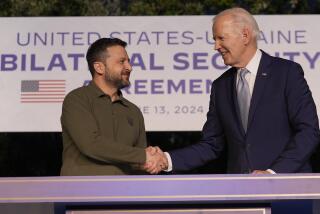Bush, Gorbachev to Meet Next Year : Baker, Shevardnadze Applaud Gains Toward Strategic Weapons Agreement
- Share via
JACKSON HOLE, Wyo. — The United States and the Soviet Union, declaring that they have reached “a new stage” of cooperation, announced Saturday that President Bush and Soviet President Mikhail S. Gorbachev will hold their first summit meeting during the first half of next year.
The announcement, setting the first U.S.-Soviet summit since Gorbachev met with then-President Ronald Reagan in December, 1988, came after the two countries made significant progress on a strategic nuclear weapons treaty and other issues during two days of talks here.
In Kennebunkport, Me., Bush told reporters that the summit would be held in “late spring or early summer” and said that he is “very pleased.” The President suggested that the meeting would probably be held in Washington.
Secretary of State James A. Baker III and Soviet Foreign Minister Eduard A. Shevardnadze also announced the summit decision after two days of meetings at the resort in the Teton mountains.
‘Confrontation to Cooperation’
“I believe U.S.-Soviet relations are entering a fresh phase,” Baker said. “We’ve moved from confrontation to dialogue and now to cooperation, joint action on common problems.”
“We have been able to make substantial progress,” Shevardnadze agreed in a separate news conference. Asked about his earlier complaints that the Bush Administration has been moving too slowly on arms control and other U.S.-Soviet issues, Shevardnadze replied: “I believe that the pace that we see now is fairly good, and I have expressed our satisfaction.
“Our talks . . . showed that the leadership of the United States also intends to work actively to achieve positive results and expand Soviet-American cooperation,” the Soviet foreign minister said.
The results of the talks allowed Bush, as he had planned, to make the summit announcement.
As the clearest evidence of progress, both U.S. and Soviet officials pointed to Shevardnadze’s declaration that Moscow is willing to conclude a strategic arms reduction treaty (START) without resolving the two countries’ disagreement over U.S. plans to test defensive weapons in space. That issue--revolving around the Kremlin’s objections to the U.S. Strategic Defense Initiative--had long been the largest single roadblock in the START negotiations.
American and Soviet officials disagreed over how sweeping the Kremlin’s concession was on the point--the Americans said it signified a complete abandonment of Moscow’s earlier position, while the Soviets were less categorical. But both sides agreed that it was a major shift that could help negotiators finish work on a START pact as early as next year.
The Soviet Union also offered a new, more flexible position on sea-launched cruise missiles, another problem issue in START. In another Soviet concession, Shevardnadze met a longstanding U.S. demand by announcing that Moscow has decided to dismantle completely its Krasnoyarsk radar station, which the United States consideres a treaty violation.
And the two countries agreed, after a 15-year logjam, on the technical details of two treaties to limit nuclear tests. Shevardnadze said Bush and Gorbachev may sign the final protocols on the two pacts--the Threshold Test Ban Treaty and the Treaty on Peaceful Nuclear Explosions--at their 1990 summit meeting.
Soviet officials noted pointedly that most of the movement on arms control issues appeared to have come from the Kremlin’s side--and several American officials, speaking on condition that they not be identified, agreed.
But Baker, with an eye to preserving a share of public credit for the Administration, admonished a reporter that the progress had come “in part because of changes in the Soviet position but also in part because of changes in the U.S. position.”
U.S. and Soviet officials both said the atmosphere of the meeting, held in a luxurious lodge and a sprawling vacation home on the shores of Jackson Lake, was also notable. Baker and Shevardnadze held long, frank discussions on the Soviet economy, human rights, Central America and other issues, they said--and succeeded in disagreeing sharply on some points without poisoning the atmosphere of discussions on arms control.
Bush learned of the summit agreement while playing golf in Kennebunkport, taking a telephone call on the 10th hole from Baker.
Shortly afterward, Bush told reporters accompanying him to the golf course: “I will be meeting with Mr. Gorbachev in late spring or early summer. That agreement is set, and I’m very pleased.”
The President also said that he was “very pleased” that agreements had been reached in several areas, which he would not discuss.
He said the summit would be held in the United States and that Washington would be the “proper” site, although such details had not been discussed.
It was the Soviets’ new position on START that drew most attention from U.S. officials here in Wyoming. Until now, Gorbachev and other Soviet leaders had said they would not conclude a treaty on strategic weapons--the long-range missiles and other offensive arms in the superpowers’ nuclear arsenals--until an agreement on weapons in space was also reached. That position reflected the Kremlin’s desire to stop the United States from developing anti-missile defenses in space under the Strategic Defense Initiative begun during the Reagan Administration.
Now, Shevardnadze said, “We would be ready to sign and ratify a START treaty even if by that time an agreement on space is not yet complete.” But he added that the Soviet Union would still insist that both sides abide by the 1972 AntiBallistic Missile Treaty, which the Kremlin interprets to ban the testing or deployment of most SDI systems.
Baker and Shevardnadze also signed a number of technical agreements, including:
-- A chemical weapons agreement under which the two counties will exchange information on the size and location of their chemical stockpiles--a step toward reducing or banning the weapons. Later, each side will allow the other to conduct on-site inspections of chemical weapons facilities.
-- An agreement to work on experiments in verifying each country’s data on missile production and deployment even before a START treaty is concluded.
-- Notice by each side of impending tests or exercises of their nuclear arsenals, including long-range bombers.
-- A ceiling on mobile long-range missiles of 10 launchers at any one base, some of which must be exposed for inspection by satellites.
-- An agreement to work toward more effective use of the World Court in The Hague.
-- A pact to allow Eskimos on both sides of the Bering Strait, in Alaska and Siberia, to visit relatives across the strait without visas; and a related agreement setting up a joint commission on U.S.-Soviet cooperation in the area, where only three miles separate the two countries’ territories.
-- An agreement on interpreting international law on navigation.
Times staff writer James Gerstenzang, in Kennebunkport, contributed to this story.
More to Read
Sign up for Essential California
The most important California stories and recommendations in your inbox every morning.
You may occasionally receive promotional content from the Los Angeles Times.














